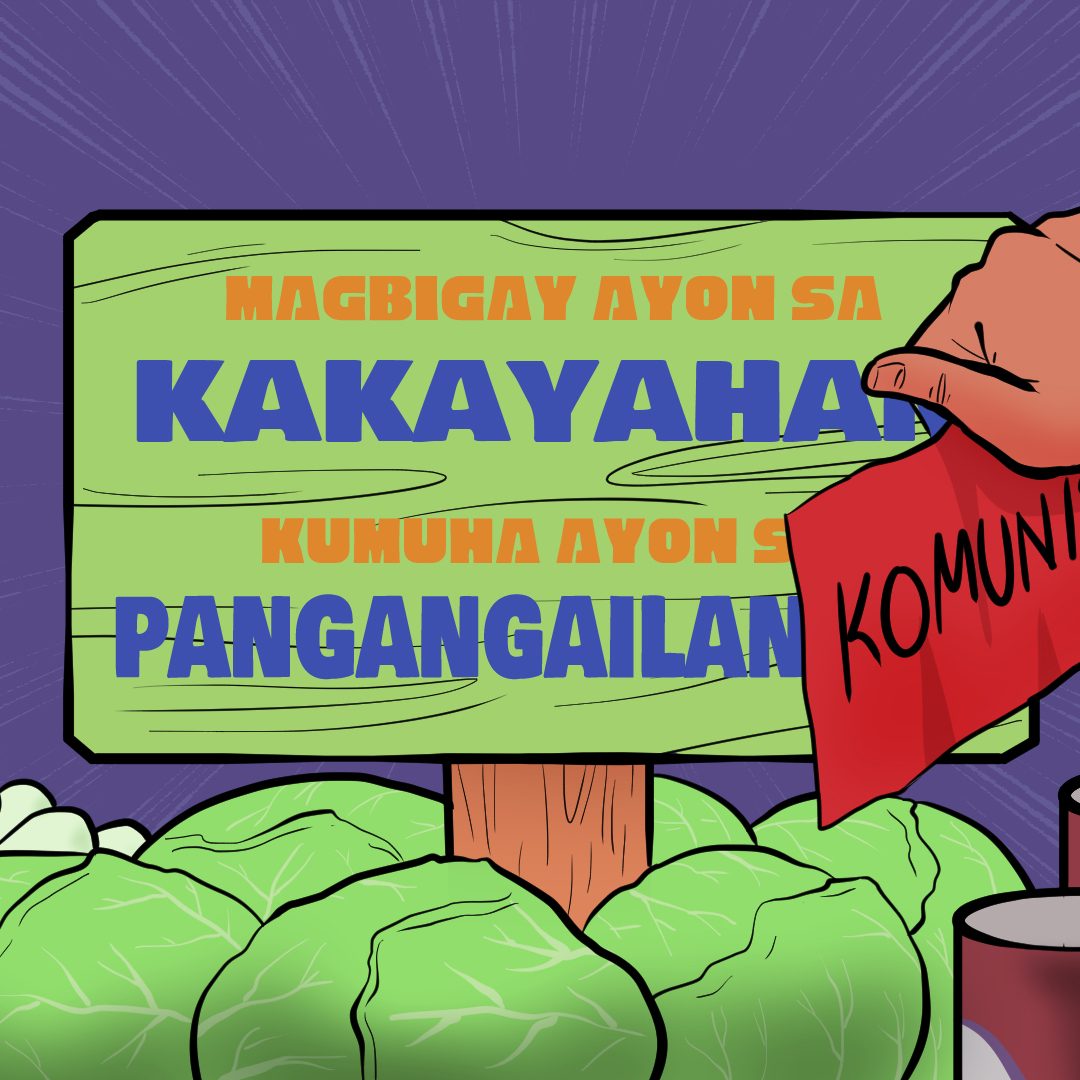SUMMARY
This is AI generated summarization, which may have errors. For context, always refer to the full article.

It started off simple: A concerned Filipino by the name of Ana Patricia Non set up a bamboo cart with vegetables on the sidewalk of Maginhawa Street in Quezon City.
Once known to be a popular hangout for food trips, the street was now filled with people lining up hungry for a different reason. They were part of the millions left starving and anxious by the government’s inadequate, if not flawed, pandemic response.
“Pagod na akong magreklamo. Pagod na ako sa inaction (I’m tired of complaining. I’m tired of the inaction),” Non, 26, said when asked why she started the community pantry, where people could give and take goods for free.
In the early months of the pandemic, Filipinos were lauded for their bayanihan spirit. Donation drives were patronized amid a hard lockdown and an emergency subsidy program’s faulty implementation. Even as donor fatigue kicked in, some kept on helping.
But there was something different about community pantries, which began a year after the pandemic started. It was a new “good” virus that was easily replicated hundreds of times around the country. Neighboring countries soon began to follow suit.
Then, politics kicked in.
As community pantries began to follow Non’s example, the Quezon City police and officials from the government’s main anti-insurgency machinery, the National Task Force to End Local Armed Conflict (NTF-ELCAC), accused the initiatives of having links to the communist movement.
Non had to temporarily close her pantry when it was red-tagged, fearing for her volunteers’ safety.
Critical Filipinos swiftly condemned the red-tagging and threw in their own political interpretations – that the pantries were an indictment of the Duterte government’s deemed inability to guarantee the Filipinos’ survival.
The simple cart with goods was now a critique, or even a “revolution,” against the government.
But the various interpretations of the pantries have agitated both pro- and anti-government Filipinos, causing fears to those operating the pantries on the ground.
Pantry visitors: Benefactors, armed men
Twenty-one-year-old John Temple is the man of the house for his four younger siblings in Nagpayong, Pasig City.
Temple is usually the person who risks his safety to go out to buy things for the family. In 2013, he had to stop schooling to take care of his siblings after his mother left to be a domestic helper in Kuwait. Meanwhile, his father, a maintenance worker, lives away from home but occasionally sends money to get the kids by.
Although their family received the P4,000 one-time cash aid from the government earlier in April, Temple still didn’t think it was enough for survival.
“Kulang pa ’yun – eh sa panahon po ngayon, mabilis na po maubos ang pera. Mabaryahan lamang, ubos na agad,” said Temple over Facebook Messenger. (It’s not enough – in these times, money runs out fast. Once you break it down, you realize you’ve spent it all.)
And so he lined up at a community pantry that opened near his area. He thinks the hour-long wait, under the hot sun, as police enforced physical distancing, was worth undertaking to cook a hearty vegetable stew for his family later that day.
Temple’s mother came home before the pandemic struck in 2020, but she would be leaving again soon for Singapore this time. It would be just him and his siblings again in a pandemic situation that isn’t projected to go away soon.
Ia Marañon, a volunteer for the community pantry in Loyola Heights, Quezon City, said the country-wide initiative was a “win-win” situation for the people who wanted to help and those who needed help.
“People wouldn’t be lining up if the government aid was enough, or if we had incentives to stay home. But we don’t. We’re left to fend for ourselves at this point in time,” said Marañon.
But, on April 20, three days after their pantry opened, armed men in uniforms paid them a visit, asking who the organizers were.
The same day, NTF-ELCAC spokesperson Lieutenant General Antonio Parlade admitted to profiling organizers.
Marañon initially did not expect an encounter, but she and her co-organizers heard of Non’s pantry closure, and so prepared themselves. She thinks the visit sowed fear among those who simply wanted to do a good thing.
“It’s frustrating that these were really well-intentioned initiatives, and then they added harm. This is exactly the opposite of what we wanted,” she said in a mix of English and Filipino.
‘Tinge of red’
One of the priorities of President Rodrigo Duterte’s administration is counter-insurgency. Organizers of communities pantries were not the first to be red-tagged – this has happened to students, journalists, and human rights defenders, to the cost of some lives.
Jayeel Cornelio, development studies program director at the Ateneo de Manila University, says the military tend to be suspicious of community-based initiatives. This is because organizers are usually critical of the state.
For example, in campaigns against illegal mining, advocates immediately implicate the local government that is in cahoots with the mining company, Cornelio illustrated.
The concept used for the community pantries, popularized by the pioneering Maginhawa pantry – “Give what you can, take what you need” – is in fact Marxist.
Communications Undersecretary Lorraine Badoy, the other spokesperson for the NTF-ELCAC, claimed the Communist Party of the Philippines was hijacking the community pantries to “deceive” the public about the administration’s “inutility.”
“Badoy’s statement is a classic example of conclusion preceding the premise. Whenever she sees a tinge of red, automatically, that’s already communist [to her]. She’s paid to do that. She dug her own grave by shaping the conversation in this manner,” said Cornelio.
To politicize or not?
For Marañon, the initiative should be politicized as much as possible.
“We’ve been talking about the gap between the rich and the poor for the longest time, but, even more so, we can see the failures of not just the government, but generally how our economy has worked in feeding that inequality,” she said.
Temple likewise feels the government’s mishandling of the pandemic, citing budget planning lapses. “Sana ayusin pa nila, dahil may ibang mga tao na di nakakuha ng ayuda dahil sa budget na ’binaba nila,” he said. (They should improve [their pandemic response] because there are people who couldn’t get aid because of the budget they lowered.)
In planning the 2021 budget, the country’s economic team said cash aid wasn’t necessary as they were confident the economy would recover. When an all-time-high COVID-19 surge began in March, triggering lockdowns once more, the government scrambled for ways to fund aid.
Political color then comes almost naturally for community pantries, even if at first they appeared to be a simple act of helping feed people. Cornelio said, “For the progressives to frame community pantries as a critique, indictment, or a revolution, is necessarily contingent upon the very character of the state.”
Cornelio said for critics, academics, or anyone who chooses to give a deeper meaning to these initiatives, the community pantries are political. But for ordinary people who simply give for the sake of giving, it may not be. But whether or not there is an intention to politicize, the fact remains that there are people hungry because of the administration’s pandemic handling, he said.
As much as Filipinos should be sympathetic to the work of pantry volunteers, Cornelio thinks the word “revolution” to describe the pantries should be used cautiously, as this “feeds into the fantasies of the war freak government.”
Changing the conversation
It was these interpretations and controversies that caused closures, and maybe even a chilling effect on people who wanted to participate. Although the QC police have apologized for red-tagging, and Malacañang has gagged Parlade and Badoy, the damage has been done. How can both pro- and anti-government treat pantries moving forward?
Cornelio said it all boils down to the way Filipinos talk about them. For one, the government can continue to apologize for red-tagging and foster genuine bayanihan spirit. But if Duterte, who curses in his pandemic addresses, refuses to change, the public can shape the conversation.
At the end of the day, there are people being fed by these pantries. For Marañon, the focus should be on them.
“The people who doubt the sustainability [and] mere existence of the pantries, to me, are not listening to what the people need. When I say we should politicize the pantries, I mean we should listen to the people who actually benefit from them,” she said.
Temple also thinks there are members of his community that are now able to eat better because the pantries have sprouted.
“If we can write about this, have conversations about the virtues that underpin these movements, I think that will be a far more compelling criticism of the failures of the state,” said Cornelio.
“In the final analysis, hindi po gumana ’yung pagmumura ninyo, sir. Walang pinakain ang pagmumura ’nyo, sir. Pero may pinapakain ang kabutihan ng mga tao – ang ordinaryong tao,” he added.
(In the final analysis, your cursing didn’t work, sir. Your cursing didn’t feed people, sir. But the kindness of some has fed others – the ordinary people.) – Rappler.com
Add a comment
How does this make you feel?


![[Be The Good] Introducing ‘The Listening Project’](https://www.rappler.com/tachyon/2024/05/carousel-4.png?resize=257%2C257&crop=424px%2C0px%2C1080px%2C1080px)

![[WATCH] #TheLeaderIWant: Filipino voters sound off on community issues a year before 2025 elections](https://www.rappler.com/tachyon/2024/05/filipino-voters-sound-off-on-community-issues-1.jpg?resize=257%2C257&crop=276px%2C0px%2C720px%2C720px)

There are no comments yet. Add your comment to start the conversation.